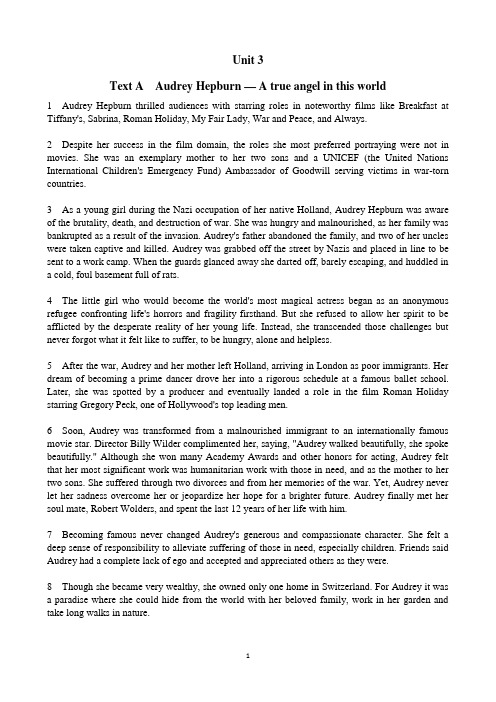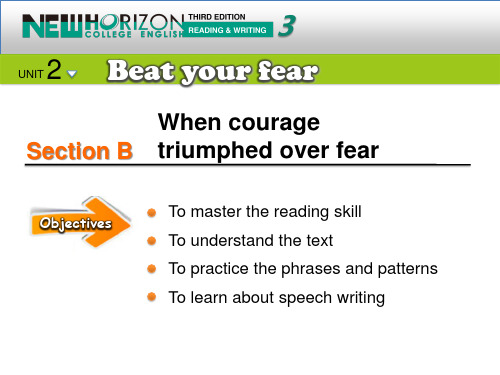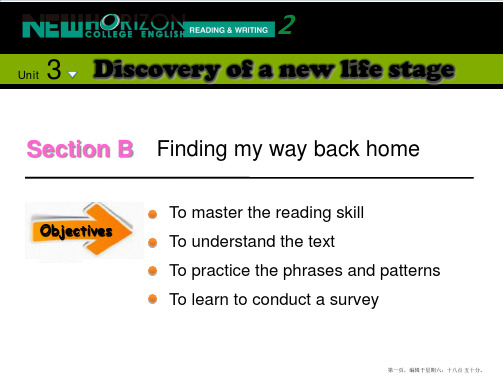第三版新视野第三单元课文预习提纲
新视野听说(第三版)2第3单元

Opening up
2 Work in pairs and discuss the question: 2 Check (✔) the ones you have never done but long to have a try and give your reasons. ☐ 1 snow skiing ☐ 10 aerobics ☐ 2 street dancing ☐ 11 water skiing ☐ 3 video games ☐ 12 stamp collecting ☐ 4 camping ☐ 13 canoeing (划独木舟) ☐ 5 bungee jumping ☐ 14 barbecue / BBQ (烧烤) ☐ 6 rock climbing (攀岩) ☐ 15 yoga (瑜伽) ☐ 7 horse riding ☐ 16 jogging ☐ 8 flower arranging ☐ 17 cycling ☐ 9 go-karting ☐ 18 Internet surfing
Opening up
2 Work in pairs and discuss the question: 1 Check (✔) the ones you have never done but long to have a try and give your reasons.
The activities I have never done but long to have a try is 14 (barbecue). I have had only restaurant BBQ. But it's not real BBQ. What I have longed for is a convivial eating experience with my family or a group of friends cooking over the campfire outdoors. We hang around the fire, hold a beer in hand, and enjoy the meat and vegetables roasted over live fire.
(完整版)新视野大学英语4第三版第四册第三单元教案

飞行员设法安全着陆了直升机。
9.hold ab。/sth。 in hith. very much
Students were excited that people they held in high regard agreed to act as their mentors。
教 案
NewHorizonCollegeEnglish
新视野大学英语4 读写教程
教研室: 教师姓名:
课程名称
大学英语(4)
授课专业
和班级
授课内容
Unit3 Fred Smith and FredEx: The vision that changed the world
授课学时
6
教学目的
The teaching objective of this unit is to help students:
b。go or cause to go in different directions。
The PM reshuffled the cabinet and adopted a more radical policy。 首相改组了内阁,并采取了更加激进的政策
3.deduce:
vt.know sth。 as a result of considering the information or evidence thatyou have
Theycontinued working for 10 days and succeeded in designing a prototype for their product.
新视野大学英语第三版读写教程第三册Unit3课文原文(A+B篇)

Unit 3Text A Audrey Hepburn — A true angel in this world1 Audrey Hepburn thrilled audiences with starring roles in noteworthy films like Breakfast at Tiffany's, Sabrina, Roman Holiday, My Fair Lady, War and Peace, and Always.2 Despite her success in the film domain, the roles she most preferred portraying were not in movies. She was an exemplary mother to her two sons and a UNICEF (the United Nations International Children's Emergency Fund) Ambassador of Goodwill serving victims in war-torn countries.3 As a young girl during the Nazi occupation of her native Holland, Audrey Hepburn was aware of the brutality, death, and destruction of war. She was hungry and malnourished, as her family was bankrupted as a result of the invasion. Audrey's father abandoned the family, and two of her uncles were taken captive and killed. Audrey was grabbed off the street by Nazis and placed in line to be sent to a work camp. When the guards glanced away she darted off, barely escaping, and huddled ina cold, foul basement full of rats.4 The little girl who would become the world's most magical actress began as an anonymous refugee confronting life's horrors and fragility firsthand. But she refused to allow her spirit to be afflicted by the desperate reality of her young life. Instead, she transcended those challenges but never forgot what it felt like to suffer, to be hungry, alone and helpless.5 After the war, Audrey and her mother left Holland, arriving in London as poor immigrants. Her dream of becoming a prime dancer drove her into a rigorous schedule at a famous ballet school. Later, she was spotted by a producer and eventually landed a role in the film Roman Holiday starring Gregory Peck, one of Hollywood's top leading men.6 Soon, Audrey was transformed from a malnourished immigrant to an internationally famous movie star. Director Billy Wilder complimented her, saying, "Audrey walked beautifully, she spoke beautifully." Although she won many Academy Awards and other honors for acting, Audrey felt that her most significant work was humanitarian work with those in need, and as the mother to her two sons. She suffered through two divorces and from her memories of the war. Yet, Audrey never let her sadness overcome her or jeopardize her hope for a brighter future. Audrey finally met her soul mate, Robert Wolders, and spent the last 12 years of her life with him.7 Becoming famous never changed Audrey's generous and compassionate character. She felt a deep sense of responsibility to alleviate suffering of those in need, especially children. Friends said Audrey had a complete lack of ego and accepted and appreciated others as they were.8 Though she became very wealthy, she owned only one home in Switzerland. For Audrey it wasa paradise where she could hide from the world with her beloved family, work in her garden and take long walks in nature.9 In 1988, Audrey was appointed a Goodwill Ambassador for UNICEF designed to provide emergency food and healthcare to children suffering the destruction of war or other catastrophes. In that role, her lifelong passion for helping those in need, found its greatest calling.10 She turned down three million dollars to pen her autobiography and instead accepted one dollar a year in the more conscientious role as diplomat for UNICEF. For seven months out of each of her last five years, she and Robby left the peace and beauty in their cozy home to embark on outreach trips into some of the most difficult places on earth. From Bangladesh, Sudan, India, Vietnam, Kenya, Ethiopia, Central and South America, to Somalia, Audrey Hepburn traveled representing UNICEF, making over 50 emotionally draining and physically dangerous missions into bleak destinations to raise world awareness of wars and droughts. Having been a victim of war, she understood the blessing of being the beneficiary of food, clothing, and, most of all, hope.11 Audrey felt it was wicked that billions of children were deprived of simple joys and drowned in overwhelming misery. She believed deeply in the ideology that all people share in the duty to care for those in need. Audrey Hepburn was always ready to lead by example. She said: "When you deny childhood, you deny life." She saw UNICEF's work as an integral, sacred force in people's lives and said of UNICEF's results, "Anyone who doesn't believe in miracles is not a realist."12 In 1992, Audrey was stricken by cancer. She, Robby and her two sons returned to their home in Switzerland for their last Christmas together.13 Audrey's long-time friend and world-famous French fashion designer, Hubert de Givenchy, spoke to his cherished friend for the last time, just before she died. He said she was "... serene at the end because she knew she had achieved everything with perfection".14 Audrey Hepburn's passion for service was enduring. Even as her life ended at 63 years of age, she remained a gracious woman who perpetually signified simplicity, charity, charm and kindness.15 The majesty of Audrey Hepburn's spirit of social responsibility and dedication lives on in her words: "Remember, if you ever need a helping hand, it's at the end of your arm. As you get older, remember you have another hand: The first is to help yourself, the second is to help others." And "For beautiful eyes, look for the good in others; for beautiful lips, speak only words of kindness; and for poise, walk with the knowledge that you are never alone."Unit 3Text B A life in filmSteven had to face rejections and obstacles in his film-creating efforts, but his persistence and dedication transformed the obstacles into an alternative route to success.1 At 12 years old, Steven Spielberg was already visiting film shootings at Universal Studios in his office suit, a packed lunch tucked into his briefcase. The young boy tried to immerse himself in film in any way possible. He had been given an administrative job at Universal Studios from a friend of his father's, and every day, even though he didn't have a legitimate security pass, he would try to manipulate his way past the guards and into his personal paradise. Such persistence is hardly surprising from a boy whose lifelong conviction was to "Make sure you are right and go on!" (adopted from a 1954 Disney film).2 When Steven was eight years old, his father gave him a Brownie 8 mm film camera as his birthday present. Steven immediately began collecting footage of family events, and he simulated action scenes with his miniature toy spacecraft, populating his films with his neighborhood friends as actors. People quickly began to recognize his terrific talent, and he won a prize for cinematography for his early westernThe Last Gunfight; years later, he won a national contest for his film Escape to Nowhere. His film Firelight was twice analyzed by a national newspaper and was presented in the city theater as if it were a Hollywood premiere. By the time he was 17 years old, Steven had established himself as a director with the artistic intuition of a man twice his age.3 His achievements are certainly related to the personal obstacles and setbacks he faced from an early age. Steven's family moved often, so that he was constantly trying to find his place in a turbulent environment with new people. Despite his natural intelligence, Steven had a carefree attitude and put little effort into school. He consistently earned only a C average, or lower. Socially, he wasn't athletic or popular, and since his conspicuous interest in film made him seem eccentric, classmates shunned and mocked him.4 His home life was not ideal either, as his father's rigid engineering temperament could not understand his or his mother's artistic personalities. Steven would miss his father when he was gone for long work trips, and then reverted to furiously arguing with him as soon as he returned. Finally, when he was in high school, his parents ended their unhappy marriage with a divorce. The theme of the lack of a father figure consistently infected Steven's films.5 Unfriendly surroundings at home and school made Steven strive even harder to achieve in the film world. He applied to two of the best film schools in the country: the University of Southern California and the University of California, Los Angeles. But even with a formidable 10 years of experiences in filmmaking and his friends atUniversal Studios endorsing him, his grades were too poor, and he was flatly turned down at both institutions.6 Unwilling to give up, Steven entered the California State University, where he hoped the program in TV and radio might open his way to Hollywood. Unfortunately, the university was not suited to his experience, and one academician recalled, "Steven knew more about cameras, mounts, and lenses than anyone else in the department. He could teach there." Despite his manifest talent, his low grades sabotaged transfer attempts, forcing real film schools to withhold acceptance.7 Steven contrived to rectify the situation on his own by diverting his attention away from academics. He cleaned his old suit and briefcase and returned to visiting Universal Studios where he had worked as a boy. He discreetly sneaked into any department he could, such as shooting rooms, editing and sound-mixing studios, and he quietly watched until he was discovered and ordered to leave. Introducing himself under the pretext of being either an actor, director, or producer, he would invite people to dinner to make connections and learn as much as he could. Even though he was caught and expelled at least once a day, he always returned to smuggle himself back in again.8 Steven repeatedly tried to prove himself to the Universal executives, while working in a cafeteria to save up money for equipment. He would discretely create scenes and then shoot and re-shoot his movies. He kept upgrading from 8 to 16 and finally 35 mm film before he was allowed a screening. Finally, his film Amblin was given a chance in front of the executives. It was a short, silent film and the plot differed greatly from the sci-fiand combat films that would later predominate Steven's career. Still, the short film was awesome enough to win Steven, only 21 years old, a seven-year contract with Universal Studios.9 After directing smaller TV dramas and low-budget projects, Steven earned the chance to direct his big Hollywood debut: a thriller film starring a shark! Jaws was a box office hit and it made Steven famous. He continued his relationship with Universal Studios to produce the notable moviesE.T., Jurassic Park, and Schindler's List.10 As his first producer said, "It is not by any coincidence that Steven is in his present position." Instead, it is Steven's committed spirit that has strengthened him in standing fast against all rejections, prejudice and skepticism and driven him to keep moving onward.。
新视野大学英语(第三版)读写教程BookIII-Unit2-Section B-When courage triumphed over fear

2. How to survive an airline crash?
Tips
Bracing for impact • Brace yourself against the seat in front of you. • Try and remain calm. • Put your oxygen mask on before assisting others.
Background information
3. fuel dumping (应急放油)
Tips
Fuel dumping is a procedure used by aircraft in emergency situations before returning to a nearby airport shortly after take-off, or before landing short of its intended destination (emergency landing). Many aircraft require the ability to dump fuel because of landing weight restrictions imposed by the manufacturers.
Section B
W h e n c o u r a g e t r i u m p h e d ove r f e a r
Warming-up
Lead-in
Background information
1. Supposing you are in the airplane, how your feeling
2. How to survive an airline crash?
新视野第四册(第三版)unit3教学教材

Smith’s military experience and what he learned from it. (Paras. 6-7)
Introduction
Introduction Body
Section One: Smith’s early life Experiences. (Paras. 3-7)
Section Two: Smith’s business experience. (Paras. 8-11)
Introduction
Section One: Smith’s early life Experiences. (Paras. 3-7)
残inv疾al者id b恶u棍lly pi捉ck弄on
包ch租a(rtve.r) 复r兴ev(ive.)
r雷ad达ar nav航ig行ation
搅d乱isr(uvp.t)
Un独iq特ue远vi见sion
e精xq心uis的ite 推de断du(cv.e) 起d草ra(fvt .) pro雏to形type q量u化anxt Reading Extr. & App. Essay Writing Further Dev.
B. Topic-centered Study of New Words and Their Use
The coursTeopoifcS?mith’s life
J幼uv年en生ile活life
尝sta试b in期te间rim pre先ce例dent
L领ea导de才rs能hip
改res组h(uvff.le)
新视野大学英语第三版第二册第三单元sectionB课件ppt

Section B F i n d i n g my way b a ck h o m e
Warming-up Lead-in
Background information
第三页,编辑于星期六:十八点 五十分。
Lead-in
Watch a video clip and answer the following questions
1. How does the man on the bus feel now and why?
Tips
His heart is filled with uncertainty and anxiety because he doesn’t know whether his love will accept him or not after three years of imprisonment. He is so anxious that he even asks the bus driver to look for him because he couldn’t bear to see what he might see.
Tips
The man asked his love to tie a yellow ribbon around the old oak tree to show that she still wants him. To his great surprise, his love ties a hundred yellow ribbons around the old oak tree to welcome him home, which is responded with cheer of all the passengers.
新视野大学英语(第三版)读写教程Book3-Unit7 Section A- Surviving an economic crisis
1) What contributed to the economic slump? 2) What are the effects of the economic slump?
Inspiring your thoughts
Lead-in
Project of the unit
Task
Talking about economic crisis
Watch the video clip and discuss the following questions in pairs. 1. What are the measures that the government has taken to get rid of the financial crisis according to the video clip? 2. Do you think the measures are reasonable according to the video clip?
Project of the unit
Lead-in
Project forecasting
Project of the unit
Economy is extremely important to both society and individuals. Like life, economies flow in circles. To face the ups and downs of life, it is essential for us to consider, carefully and seriously, various economic issues that are happening every day. That’s what you are expected to learn and talk about in this unit. By the end of this unit, you are expected to give a report on the following topic:
第三单元单元预习
我的方法
比较记忆: 漫—慢;挤—济;叉—又;晖—辉;姗-珊。
形声字记忆: 漫、涛、挤、绣、潇、绽、朦、胧、晖、徜、徉、姗
认读词语
墨绿 繁星 ห้องสมุดไป่ตู้拍 整齐 交叉
嫩绿 藤萝 白桦 毛茸茸 指挥
淡绿 波涛 花卉 潇洒 集中
粉绿 墨水瓶 朝霞 朦胧
教练 寂静
《短诗三首》+《绿》+《白桦》
四年级下册 第三单元 第1课时 单元预习课
这个单元四篇课文,你发现这组文章都是什么体裁了吗? 现代诗歌
明确目标
单元目标提示我们读这组现代诗歌,要达到怎样的要 求呢?
明确目标
再找找,这一单元的实践表达要求是什么?
认读生字
没有拼音,你认识吗?
漫、涛、挤、叉、绣、潇、绽、 朦、胧、晖、徜、徉、姗
新视野大学英语第三版第二册第三单元-Section-A
• To regard them as our friends
Pre-reading activities
Listen and talk
Listen to a short passage concerning adolescent reaction and fill in the missing information.
• To regard it as a slur on their own cooking, or cleaning, or furniture
• To consider their children will not love them anymore
• To be jealous of other parents
— Boris Kodjoe
Parents can only give good advice or put their children on the right paths, but the final forming of a person’s character lies in their own hands.
新视野大学英语(第三版)读写教程BookIII-Unit4-Section A-The Surprising purpose of travel
Lead-in
Group discussion
2. Try your best to list the reasons that people travel.
To have a change To experience something new and unfamiliar To see the world and understand different culture To marvel at the wonder of great nature To escape from a boring lifestyle To have a thorough relaxation To broaden one’s horizons ……
1. Why do many people choose to visit Xi’an?
• One of the most ancient cities in China; • Its diverse and rich selection of local food; • Easily accessible and frequent flights and trains; • A reputation all over the world; • If you have not been to Xi’an, you have not been to China.
Summary
Section
A
T h e s u r p r i s i n g p u r p o s e o f t rave l
Warming-up Activities
Lead-in
Pre-reading Activities
Cultural Background
